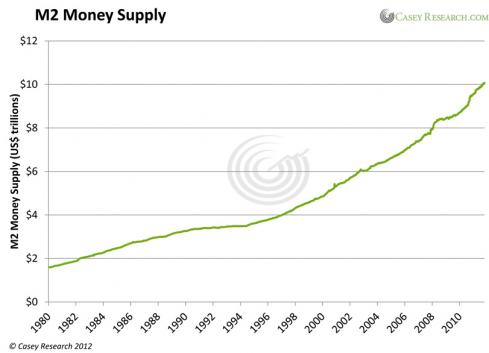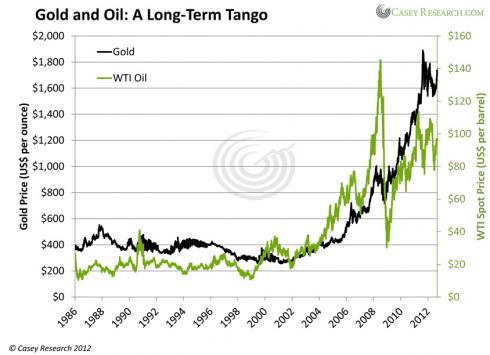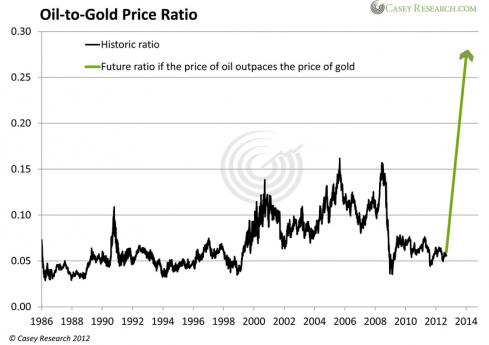
Never mind that two previous rounds of quantitative easing failed to achieve that goal; that the funds to support this new round of stimulus don't exist; or any number of other reasons to believe QE3 will fail.
It doesn't matter. QE3, another year of Operation Twist, the EU's new $645-billion rescue fund – these massive stimulus measures are now just a drop in the overflowing bucket of global money supply. From Germany to Japan to Brazil to the United States, the world's big economies are drowning themselves in their own currencies.
As the number of dollars, euros, and yuans in existence climbs inexorably, each dollar, euro, and yuan loses value. In fact, the entire concept of "fiat currency" – pieces of paper that only bear value because society and government agree that they do – loses ground.
What gains ground in their stead? Gold, of course.
Kings and emperors started trying their hands at fiat currency systems long ago, but time and again the paper currencies would drown in hyperinflation, and everyone would switch back to bartering with the world's only tried-and-true currency: gold. In the United States, gold was the true medium of exchange until just forty years ago – until Nixon ended the gold standard in 1971, the US dollar was not a fiat currency but a "representative currency," which means that dollars were valuable because they represented a certain amount of gold or silver.
Today, with US money supply having doubled almost three times since 1980, many are predicting the demise of the dollar.

When the dollar dies, gold will return to its former glory as the standard-bearer of economic value. As this transition takes place, gold's value will rocket upward, both in terms of dollars and in terms of absolute worth. It is simple economics: As people ditch the dollar, demand for the yellow metal will rise, but supply will remain limited.
This is the gold bull argument, a simple but solid rationale that predicts a very bright future for gold. It is because of this prediction that investors the world over – including many Casey colleagues – continue to buy gold, even though it is already priced near historic highs (in inflation-adjusted dollars). Gold prices may seem high now, but in a decade or two $1,600-per-ounce gold will seem incredibly cheap.
I agree: Gold is a great investment. But there's another commodity worth buying – one that will outperform gold in the long run.
Yes, there's a buy that's better than gold. I'm talking about oil.
Better than Gold
Most gold bugs agree that when the dollar dies, the price of oil will rise right alongside the price of gold.
As fundamental commodities with limited availability and rising demand, oil and gold show strong correlation. Since the US abandoned the gold standard in 1971, letting the market price gold all on its own, the prices of oil and gold have moved in sync most of the time.

The lines seem to track pretty closely, but for a more analytical look at the relationship, move on to the next chart. It shows the ratio of the price of oil to the price of gold – in other words, it tells us how many ounces of gold it has taken to buy a barrel of oil each year since 1986. While this ratio has remained relatively stable in recent decades, I see it only going in one direction from here: up.

Why am I so sure that oil will become more valuable than gold? Because of one simple fact:Gold is made into bars, coins, necklaces, and rings that will be bought and sold for years… but oil gets burned.
The economic forces behind oil and gold are very similar. Both are natural resources that must be extracted from the earth. Both are available in limited quantities. Both are (or, in the case of gold, will be) essential to the operation of modern society: oil powers our homes and industries, and gold will be the currency in which oil is traded when fiat currencies collapse.
But the big difference – the difference that will give oil the edge over gold in the coming years – is that gold is traded, but oil is traded and consumed. Sure, some gold jewelry leaves the market permanently, buried with its owner or lost while swimming or eaten by the dog, and is never recovered. But even though almost 80% of the world's annual gold production is made into jewelry, all those rings and earrings and gold teeth for rappers are still present on earth and still contribute to the global gold count.
Over the last ten years, as the price of gold tripled, we have seen very clearly the ease with which all that jewelry can re-enter the investment pool. In Italy, the number of Compro Oro or "I Buy Gold" shops has tripled in the last two years. There are now an estimated 28,000 such outlets in the country, and proprietors say Italians of all kinds are coming in to trade their gold jewelry for cash. Since the recession, I have heard similar stories across North America and throughout Europe.
When the going gets tough, sentimentality gives way to practicality, and families start to see their jewelry boxes as savings accounts. And as the price of gold continues to climb, more and more gold jewelry will return to the market.
So while jewelry takes gold off the market for a time, rarely does gold leave the global pool permanently.
Oil, on the other hand, is constantly consumed. Every day no fewer than 87 million barrels of oil disappear forever in a puff of exhaust, a pile of pills, a bag full of Styrofoam, a replaced asphalt roof, and a new set of seals in Jeff Phillips' 1964 Cadillac convertible.
Oil is traded and consumed. Production only just keeps ahead of demand. No one buys physical oil to hold as an investment – you'd need to bury a tank farm in your backyard, for one, but more importantly that's not the way the oil world works. Rather, the world's black gold is a slippery, moving target, one that is generated and consumed apace.
With each barrel burned, the world's remaining oil reserves become a bit more valuable.
There are lots of reasons why oil prices are headed sky-high in the long term. Oil is increasingly difficult to find and evermore expensive to produce. The environmental, economic, and social risks that burden oil companies become heavier every year. Global demand keeps climbing, and oil-needy nations are racing to lock up foreign reserves to power their futures.
Every time you fill your tank with gas, every time you fly on a plane, every time you throw out a plastic spoon or buy a liter of oil for your chainsaw or add a new tube of mascara to your makeup case, you are consuming oil. The oil used to make those items will never exist again. It is gone, and without it the world has just a bit less oil left to power its future.
As is so often the case with oil, it boils down to basic economics. Demand and production costs are both rising, but availability over the long term is falling. It's a double-whammy price push.
So keep this in mind: When money dies, gold will be a winner, but the biggest winner of all will be oil… and anyone along for the ride will make generational wealth.
Marin Katusa
Casey Research
Additional Links and Reads
Doug Casey and Marin Katusa Discuss the Next Generation of Resource Superstars (YouTube)
If you have ten minutes to spare today, spend it watching this video by Future Money Trends. All of Casey Research's successful strategists believe that people are the most important aspect of any investment, and that by following the right people investors can ride a wave of success. In this video, Doug and Marin discuss the next generation of superstars in the resource sector – the people who could contribute handsomely to your portfolio for years to come.
Japan to Phase Out Nuclear Power (Financial Times)
Japan will phase out nuclear power by 2040, marking a major policy shift and the first formal decision to retreat from atomic energy sine the disaster at Fukushima 18 months ago. Before suspending operations at almost all of its reactors following Fukushima, Japan had been the world's third-largest nuclear-powered nation and had gleaned 30% of its electricity from nuclear reactors. Already the world's third-largest importer of crude oil and largest importer of thermal coal and liquefied natural gas, Japan will need to boost hydrocarbon imports to supplant nuclear generation, as reactors reach the ends of their operating lifespans and are shut down.
Shell Delays Arctic Oil Drilling Until Next Year (New York Times)
In the latest of a series of setbacks, Shell has been forced to delay drilling for oil in Alaskan Arctic waters until next year after a spill containment dome was damaged during a testing mishap. The company will still complete preliminary work on several wells. After six years and $4.5 billion worth of effort, Shell had expected to drill up to five wells this summer and fall, but a series of equipment problems and persistent sea ice forced repeated delays and cutbacks.
EU Gas-Price Row Heats Up (Reuters)
Relations between natural-gas suppliers and consumers in Europe are reaching a crunch point over pricing, as buyers seek to escape from high-priced long-term contracts in order to capitalize on lower prices available elsewhere. Major gas exporters like Russia, Norway, and Qatar mostly sell under long-term contracts wherein prices are linked to oil. Since oil prices have stayed high despite global economic turmoil, European utilities and gas suppliers are being squeezed – they have to buy gas at oil-linked prices but sell it at lower spot prices. The standoff is now set to become much more political, as Russian President Vladimir Putin issued a decree protecting Gazprom from an EU anti-monopoly investigation.
Optimism (Financial Post) versus Peril (Globe and Mail) – Debating the Outlook for Canadian Crude
The contrast between these two articles is a nice demonstration of the range of forecasts out there for Canadian oil producers. One article, titled Despite US 'Tight Oil Renaissance,' Optimism Pervades Canada's Oil Sands Sector, argues that oil-sands producers are optimistic about US demand for Canadian crude because they doubt that the massive production volumes predicted from tight oil plays in the United States will actually materialize. The same day, an article in a different newspaper (US Boom in Oil Production Spells Peril for Canadian Crude) discusses how the US is now "staring at an energy future awash with its own crude," and asserting that this flood of domestic production will squeeze out any room for growth in Canadian exports to the US.


























































